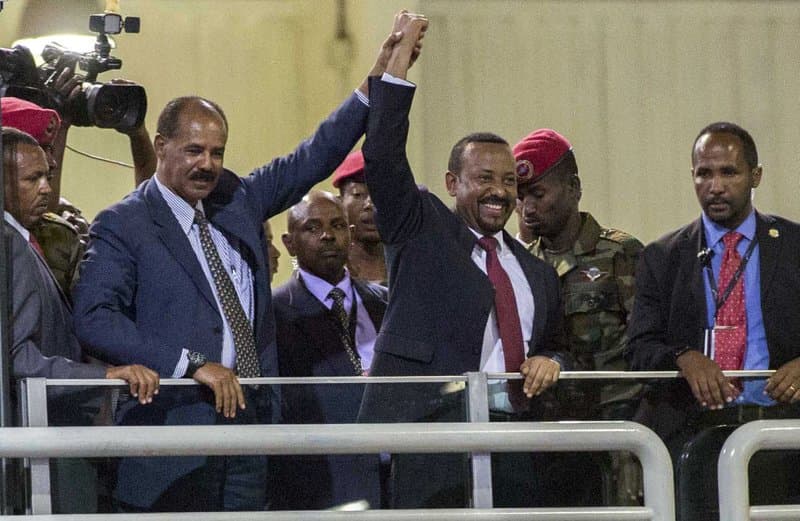YAOUNDÉ, Cameroon – In Ethiopia and Eritrea, the Church has been suffering. Over the past two years, over 30 churches have been attacked in Ethiopia – half burned to the ground – leaving over 100 people dead. In Eritrea, where Catholics make up just about 4 percent of the population, Church-run schools and hospitals have been forcefully shut down by the government.
The pontifical charity Aid to the Church in Need (ACN) has launched an appeal to help its efforts in the two Horn of Africa countries.
“Both Ethiopia and Eritrea are suffering from poverty and economic instability,” said Edward F. Clancy, the director of outreach for ACN.
“In Ethiopia, although Christians are a majority there has been a spate of violence against Christians and Christian institutions over the last two years. The violence has been due to a mixture of ethnic, political and religious differences, but nonetheless, it has caused more instability and fear,” he explained. “In Eritrea, the totalitarian government has gone after Christian institutions and lately those of the Roman Catholic Church to lessen the impact that the Church has on Eritrean society.”
What follows are excerpts of Crux’s conversation with Clancy.
Crux: Can you describe the circumstances for Christians in Ethiopia and Eritrea?
Clancy: Both Ethiopia and Eritrea are suffering from poverty and economic instability. In Ethiopia, although Christians are a majority there has been a spate of violence against Christians and Christian institutions over the last two years. The violence has been due to a mixture of ethnic, political and religious differences, but nonetheless, it has caused more instability and fear.
In Eritrea, the totalitarian government has gone after Christian institutions and lately those of the Roman Catholic Church to lessen the impact that the Church has on Eritrean society. Last year, the government shut down all the Catholic run hospitals and clinics after having closed all the Catholic schools earlier.
Can you give us more details of the persecution of Christian groups in Ethiopia, especially given it is a historically Christian country?
As I mentioned previously, the violence against Christians is a mix of ethnic, political and religious conflicts. There have been numerous attacks on Christians by Muslim groups particularly in south where Christians are in the minority. Additionally, there has been conflict within the Christian community. The mixture of internal tumult and the injection of radical Islamic ideology is making for a toxic mix that could further instability and cause more bloodshed.
So are the apparent religious tensions really ethnically-based?
Ethnic conflict plays a major role in the religious tensions. There are those terrorist groups who nevertheless will use the ethnic turmoil to further a jihadist agenda within Ethiopia as has happened in other countries in the Sub-Saharan Africa.
Since 2018, there have been a series of church burnings in Ethiopia. Is this also due to Muslim extremism?
Yes. Throughout Africa, the culprit has most often been Islamic extremist groups who seek to destroy any vestige of Christianity from the land and particularly by destroying churches. Money from the Gulf States has poured in for the building of Islamic schools that teach the Wahhabi Islamic philosophy. The philosophy is very intolerant of other religions and especially Christianity. So now we very well might be seeing the fruits of this investment.
While attacks on Christians in Ethiopia are largely carried out by non-state actors, the violence in neighboring Eritrea is often government sponsored. Why is that?
The government in Eritrea has been unelected since its founding; in other words, a dictatorship. President Isaias Afwerki does not want other institutions to instill opposition or self-reliance in the people. The Church has opposed the brutal actions of the government and spoken out against the president and his administration. Because of this, they have become a target.
Is there any religious freedom in Eritrea?
There is not true religious freedom in Eritrea. The government allows those groups who will not speak out to remain and to worship, but does not want any group to exert influence. Christian and Muslim schools have been closed and the hospitals run by the Catholic Church were shut down and all the equipment in them taken by the government.
How has Aid to the Church in Need been active in the region?
Our work with the Catholic Church in Ethiopia has been primarily in the area of construction, formation of clergy, religious and laity incl. scholarships. Last year we provided over $800,000 to sustain the Church.
In vicariates such as Soddo and Gambella, although the Catholic population is still small minority, the Catholic presence has helped to quell hostilities. The Chapel of Our Lady in Shebbo has been a place of hope for the people and place of welcome for Catholic and non-Catholic alike. We believe that Catholic Church can be like the yeast that Christ calls us to be and help to grow peace amongst the people of Ethiopia.
Since 2016, Aid to the Church in Need has financially supported dozens of projects in Eritrea for a total of about $1.25M. Our areas of support have been to aid building chapels and Church facilities, for Mass stipends and vehicles to help priests and nuns reach the people, and subsistence aid for religious sisters.
How has been the response to the appeal ACN launched for the two countries?
Our ACN family always answers the call. They have continued to do so, but we do need more. We would like people to continue to pray for the people of Eritrea and Ethiopia and if they feel called to give, know that their donation, no matter how big or small will serve a great need in East Africa.














